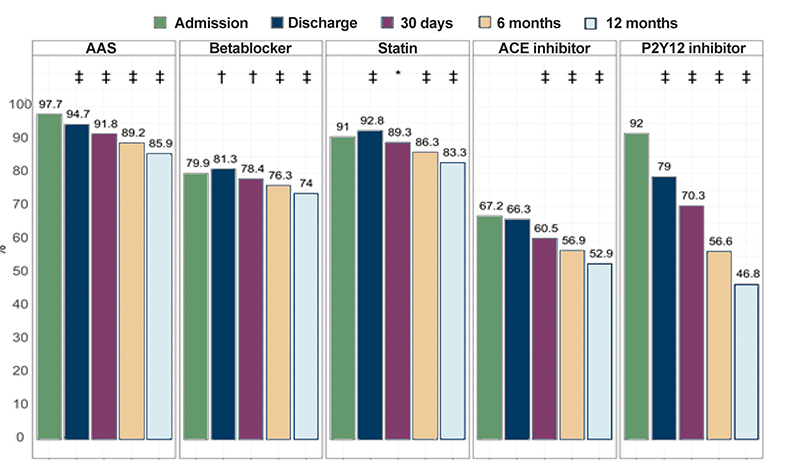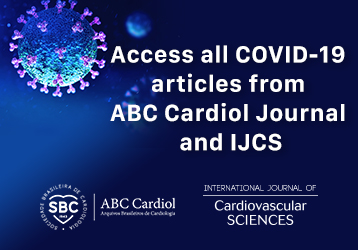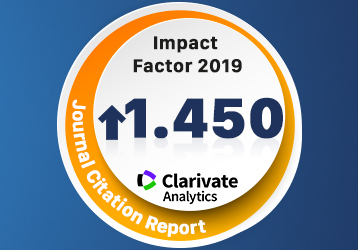Volume 114, Nº 6, June 2020
DOI: https://doi.org/10.36660/abc.20190879
SPECIAL ARTICLE
One year follow-up Assessment of Patients Included in the Brazilian Registry of Acute Coronary Syndromes (ACCEPT)
Pedro Gabriel Melo de Barros e Silva
Otavio Berwanger
Elizabete Silva dos Santos
Antônio Carlos Sobral Sousa
Margaret Assad Cavalcante
Pedro Beraldo de Andrade
Fernando Carvalho Neuenschwander
Hugo Vargas Filho
Jorge Ilha Guimarães
Jadelson Andrade
Angelo Amato Vincenzo de Paola
Marcus Vinicius Bolivar Malachias
Luiz Alberto Piva e Mattos
Dalton Bertolim Precoma
Fernando Bacal
Oscar Pereira Dutra

Figure 1 - Adherence to evidence-based therapies in the first year of follow-up. To compare the continuity of medical prescription in follow-up with admission, a model of Generalized Estimating Equations (EEG) was adjusted for binary data, to take into consideration the dependence between observations. ‡ P-value < 0.001; Comparison between follow-up and admission; † P-value < 0.01; Comparison between follow-up and admission; * P value < 0.05; Comparison between follow-up and admission.
Abstract
Background: There is lack of prospective data on evolution within one year of acute coronary syndromes (ACS) in a representative population of Brazilian patients.
Objectives: To assess the prescription of evidence-based therapies, the incidence of severe outcomes and the predictors for these outcomes in a multicenter Brazilian registry of ACS patients.
Methods: The ACCEPT is a prospective observational study, which included patients hospitalized with a diagnostic of ACS in 47 Brazilian hospitals. The patients were followed for a 1 year and data were collected on the medical prescription and the occurrence of major cardiovascular events (cardiovascular mortality, reinfarction and cerebrovascular accident - CVA). Values of p < 0.05 were considered statistically significant.
Results: A total of 5,047 patients were included in this registry from August 2010 to April 2014. The diagnosis of ACS was confirmed in 4,782 patients (94.7%) and, among those, the most frequent diagnosis was ACS with ST segment elevation (35.8%). The rate of major cardiovascular events was 13.6 % within 1 year. Adherence to prescription of evidence-based therapy at admission was of 62.1%. Age, public service, acute myocardial infarction, CVA, renal failure, diabetes and quality of therapy were associated independently with the occurrence of major cardiovascular events.
Conclusions: During the one-year follow-up of the ACCEPT registry, more than 10% of the patients had major cardiovascular events and this rate ranged according with the quality of therapy. Strategies must be elaborated to improve the use of evidence-based therapies to minimize the cardiovascular events among the Brazilian population. (Arq Bras Cardiol. 2020; 114(6):995-1003)
Keywords: Acute Coronary Syndrome; Myocardial Infarction; Risk factors; Medical Records/ statistics& numeral data; Multicenter Studies.















